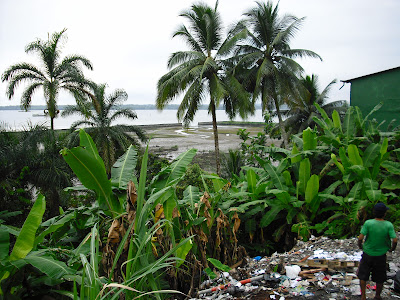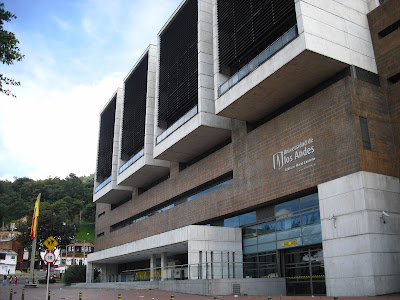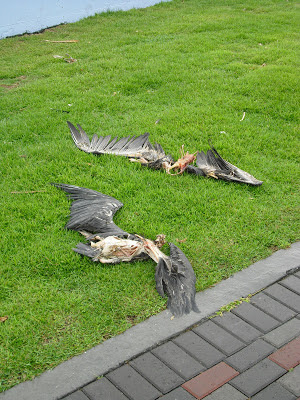It shouldn’t come as a major surprise to regular readers that we’re not averse to squalid settings every now and again. It’s just as well, of course, for as beautiful as Colombia is in a natural sense, many — but not all it must be said — of its urban dwellings make European rubbish tips seem idyllic.
Last year we had the pleasure of checking out two such ‘dirty towns’, Turbo (see 'Turbo Living' http://bit.ly/SVtkWW) and Maicao (see 'Dirty Old Town' http://bit.ly/VG94Ho). You could also throw a large portion of Bogotá – our home, on and off, for the last 15 months – onto this list.*
It’s not that we enjoy the dirt or take some sort of perverted satisfaction from seeing it strewn about the place, far from it. But scrape back a bit of the material waste and in most of these places — less so, perhaps, in the sprawling metropolis of Bogotá — you’ll find extremely friendly, laid-back people (laid-back to the point that collecting rubbish is seen as a waste of time — ‘Sure won’t Mother Nature break it down after a while?’) with what appears to be a generally healthy attitude to life.
So sticking to type, this is pretty much what we found in Colombia’s Pacific coast city of Buenaventura.
 |
| Adding a bit of colour to the natural environment. |
So sticking to type, this is pretty much what we found in Colombia’s Pacific coast city of Buenaventura.
Now, it was for reasons of transport that we had to pass through the place, our final destination being Bahía Solano, a tranquil little coastal town further north, reachable only — unless, that is, you fancy a wild trek through inhospitable jungle (next time) — by boat or plane (we took the former option, hence the stop in Buenaventura).
In fairness, and as is the case with Turbo and Maicao, the fact that most of the respected travel books on Colombia suggest giving the city a wide berth or if you have to stay for some reason then just make it brief, we were always tempted to check it out on its own merits. Not just using it as a transport hub that is.
Indeed, it does still see a fair number of visitors. And mirroring Colombia as a whole this number is increasing all the time, although many of these are just passing through, visiting some of the beaches that are short speedboat rides away (our destination of Bahía Solano, on the other hand, is a much longer trip – more on that in the coming weeks).
In fairness, and as is the case with Turbo and Maicao, the fact that most of the respected travel books on Colombia suggest giving the city a wide berth or if you have to stay for some reason then just make it brief, we were always tempted to check it out on its own merits. Not just using it as a transport hub that is.
Indeed, it does still see a fair number of visitors. And mirroring Colombia as a whole this number is increasing all the time, although many of these are just passing through, visiting some of the beaches that are short speedboat rides away (our destination of Bahía Solano, on the other hand, is a much longer trip – more on that in the coming weeks).
The fact that it is also the most important port city on the country’s Pacific coast means that it gets plenty of sailors coming and going, too. So foreign faces are not uncommon.
It is, though, home to a large number of Afro-Colombians, so the whiter your skin, the more you stand out. This can be both a good and bad thing. Good in so far as people like to talk with you, from a single-male perspective that can be very positive. Bad in the sense that, as happens in many places across the globe, some people here equate white skin with lots of money. If only they knew.
 |
| Well, at least there's a positive outlook as regards the rubbish. |
Thankfully, such negative attention wasn’t very prevalent during our short stay there. In fact, our previous view that Afro-Colombians are the least friendly of the ethnic groups that live in the country was pleasantly altered. They can still be, however, a little disobliging when it comes to bus journeys. We all have our flaws.
It has been said that the city is the capital of arguably one of Colombia’s strongest underground exports — prostitutes.** From what we witnessed, it’s hard to disagree (wait a second, is that why the women were so friendly?). There were many of them ‘playing the game’ in any case. Throw in the fact that one of the semi-respectable hotels we stayed in seemed to double up as a brothel and you begin to see the importance of the industry to the place.
It has been said that the city is the capital of arguably one of Colombia’s strongest underground exports — prostitutes.** From what we witnessed, it’s hard to disagree (wait a second, is that why the women were so friendly?). There were many of them ‘playing the game’ in any case. Throw in the fact that one of the semi-respectable hotels we stayed in seemed to double up as a brothel and you begin to see the importance of the industry to the place.
Mentioning hotels, we must give a plug to ‘Hospedaje Bahia Mar’. At the equivalent of about US$8 a night, it’s one of the best value-for-money spots we’ve stayed at in Colombia. And sticking with the sex-tourism theme, it’s the only hotel/hostel we’ve been in that has a porn channel free to watch on your bedroom TV. How thoughtful.
What’s more, the first guy we befriended, a very helpful lad at that, seemed to be some sort of a pimp. Each to their own and all that.
What’s more, the first guy we befriended, a very helpful lad at that, seemed to be some sort of a pimp. Each to their own and all that.
On a broader scale, this is the place where many of these ladies of the night learn their trade before hitting for the traditionally economically stronger Latin American countries. Chances are if you meet a Colombian prostitute in the likes of Brazil or Chile, she more than likely hails from Buenaventura or its surrounds.
Outside of all that, in terms of what to do in the city itself, well there’s not an awful lot. Granted, our stay was limited to the centre, the part nearest the sea/port (the city is divided into two parts, joined by a bridge).
 |
| The seaside park is relatively nice. |
But from what we saw in passing of the outer part of the city, much of it resembles a shanty town and didn’t look that appealing. At least in the centre there’s a seaside park and accompanying views of the ocean.
If you can find a half-clean park bench to sit on it’s a relatively nice place to read a book and watch boats sail in and out in the muggy afternoon heat.
There’s also Zona Franca, the city’s duty-free zone in a sense, where you can do some bargain hunting for all sorts of goods if that’s your thing. For us, the cheap eats and drinks that can be found in the place were very satisfying, along, of course, with the aforementioned friendly locals.
As for the dirt, sure no place is perfect.
* For more on Bogotá's rubbish, see 'Petrograd - Colombia's new capital?' http://bit.ly/U4ViiJ & 'Small steps to a cleaner, greener Bogotá?' http://bit.ly/WFOPsW
** For related articles on prostitutes in Colombia, see "Bienvenidos a Medellin - 'Bangkok Light'" http://bit.ly/N83NbB & 'What a mother hooker!' http://bit.ly/XEAefP
As for the dirt, sure no place is perfect.
* For more on Bogotá's rubbish, see 'Petrograd - Colombia's new capital?' http://bit.ly/U4ViiJ & 'Small steps to a cleaner, greener Bogotá?' http://bit.ly/WFOPsW
** For related articles on prostitutes in Colombia, see "Bienvenidos a Medellin - 'Bangkok Light'" http://bit.ly/N83NbB & 'What a mother hooker!' http://bit.ly/XEAefP





